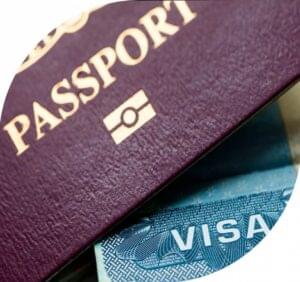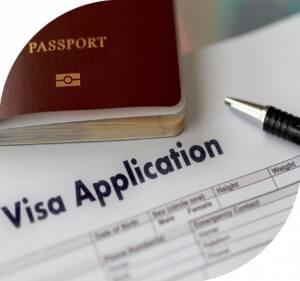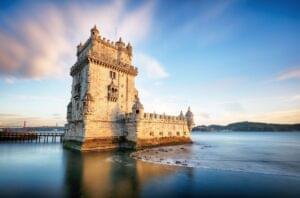D7 Passive Income Visa Portugal. Guide 2024
In recent years, the popularity of the D7 Visa has increased significantly, with many foreigners attracted to Portugal’s sunny climate, beautiful beaches, and relatively low cost of living. The Portuguese government has also introduced other incentives, such as tax breaks for non-habitual residents, to make Portugal even more appealing to foreign investors and retirees.
What is D7 Visa Portugal?
The D7 Visa is a long-term residence visa for non-European Union (EU) citizens who wish to live in Portugal for a period of more than 90 days. It is intended for those who are financially self-sufficient, such as retirees, independent workers, or investors.
Portugal introduced D7 Visa in 2007. It was a way to attract foreign investment and promote economic growth, by encouraging retirees to spend their retirement years in Portugal. It is one of the most popular visas in the country along with Portugal Golden Visa.
The D7 Visa is named after the Portuguese Immigration Law Article 7. It sets out the requirements for granting residence visas to those who are financially self-sufficient. To be eligible for the D7 Visa, applicants must demonstrate that they have sufficient financial means to support themselves and any dependents while living in Portugal, and that they have valid health insurance. They must also provide evidence of accommodation in Portugal, either through ownership or rental, and have a clean criminal record.
Since its introduction in 2007, the D7 Visa has become an increasingly popular choice for foreign investors, entrepreneurs, and retirees seeking to live in Portugal. In terms of country of origin, the majority of D7 Visa applicants come from countries outside the European Union (EU). In recent years, the most common nationalities of D7 Visa applicants have been from Brazil, followed by the United States, China, India, and South Africa. However, the specific rankings and numbers of applicants from each country can vary from year to year.
Benefits
D7 Visa has been a successful tool for attracting foreign investment and promoting economic growth in Portugal. It also provides an opportunity for foreigners to enjoy the country’s many attractions and amenities.
- Freedom to live and work: With a D7 Visa, individuals have the freedom to live and work anywhere in Portugal. They can also travel within the Schengen area without a visa.
- Access to healthcare: Portugal has a public healthcare system that provides access to quality medical care at a fraction of the cost of private healthcare. D7 Visa holders are eligible to enroll in the national health service.
- Affordable cost of living: Portugal is known for its affordable cost of living, especially when compared to other European countries. This makes it an attractive option for retirees, digital nomads, and anyone looking for a more affordable lifestyle in EU.
- High quality of life: Portugal consistently ranks as one of the best countries in the world for quality of life. With its mild climate, beautiful landscapes, and welcoming culture. It’s easy to see why so many people choose to make Portugal their home.
- Low taxes: Portugal offers several tax incentives for individuals who obtain the D7 Visa, including a 10-year tax exemption on foreign income of certain kind and no inheritance tax.
- Access to education: Portugal has a well-respected education system, with numerous universities and colleges that offer courses in English. D7 Visa holders can enroll in courses and benefit from the country’s high-quality education system.
- Business opportunities: Portugal is home to several startup incubators and accelerators, making it an attractive location for entrepreneurs and investors. D7 Visa holders can take advantage of these opportunities to start or grow their own businesses.
Process for D7 Visa Portugal
The timeline for obtaining a D7 Visa in Portugal can vary depending on several factors, including the applicant’s country of origin and the processing times at the Portuguese consulate. However, here is a general timeline of the D7 Visa process:
- Gather required documents: The first step in the process is to gather all the necessary documents, including a valid passport, criminal background check, proof of health insurance, and evidence of sufficient income.
- Once all the required documents have been gathered, the next step is to schedule an appointment at the nearest Portuguese consulate. The wait time for an appointment can vary depending on the consulate, but it can take several weeks or even months.
- Submit application: At the appointment, the applicant will need to submit their documents and pay the application fee. The consulate will then review the application and decide whether to grant the D7 Visa. This can take several weeks to several months, depending on the volume of applications at the consulate. This temporary D7 Visa is valid for four months.
- Travel to Portugal: If the D7 Visa is approved, the applicant will travel to Portugal within the next four months to finalize the process. Upon arrival, the applicant will need to book a meeting with AIMA (former SEF), immigration government office.
- Attend the appointment: During the appointment at AIMA, you will need to submit your application and all necessary documents. The AIMA official may ask you additional questions about your eligibility and may also ask for additional documents. It’s important to be prepared to answer questions and provide any requested documentation.
- Renewal: The D7 Visa is valid for two years and must be renewed after. The renewal process requires submitting updated documents to the Portuguese authorities, including proof of income and health insurance.
Overall, the timeline for obtaining a D7 Visa in Portugal can range from a few months to a half a year. It depends on various factors. It is important to plan ahead and be patient throughout the process.
List of documents for D7 Visa Portugal
Here is a list of documents that are typically required for a D7 Visa application at a Portuguese consulate:
- Valid passport: The applicant’s passport must be valid for at least three months beyond the intended stay in Portugal.
- Criminal background check: The applicant must provide a recent criminal background check from their country of origin or any country where they have lived for more than six months in the past year.
- Proof of income: The applicant must provide evidence of sufficient income to support themselves in Portugal. This can come from various sources, such as retirement pensions, investments, or rental income. The minimum monthly income required, at least €820 per month. Varies depending on the number of people in the household.
- Health insurance: The applicant must provide proof of health insurance that is valid in Portugal.
- Accommodation proof: The applicant must provide proof of accommodation in Portugal, such as a rental agreement (minimum 12-month lease agreement) or deed.
- Application form: The applicant must fill out and sign the D7 Visa application form.
- Passport photos: The applicant must provide two recent passport photos.
- Visa fee: The applicant must pay the visa fee, which varies depending on the consulate.
- Other documents: The consulate may request additional documents depending on the applicant’s individual circumstances, such as proof of marital status, proof of educational qualifications, or proof of business ownership.
It’s important to note that the specific requirements for a D7 Visa application may vary depending on the consulate and the individual circumstances of the applicant. We recommend to contact the nearest Portuguese consulate for detailed information on the application process and required documents.
Minimum Stay Requirements for the D7 Visa
Failure to meet the minimum stay requirements without valid justification may result in the cancellation of the residence permit.
To maintain the temporary residence permit, individuals must not be absent from the country for six consecutive months or eight non-consecutive months within the overall validity period of their residency.
To retain the permanent residence permit, individuals should not be absent from the country for 24 consecutive months or 30 non-consecutive months within a three-year period.
Please note that there may be exceptions and variations to these rules in specific cases, such as professional obligations or unforeseen circumstances. In such cases, it may be possible to exceed the designated periods of absence.
Costs for D7 Visa Portugal
Here is a list of expenses you should expect to pay when applying for a D7 Visa in Portugal. Please keep in mind that these costs may vary depending on your individual situation and the specific service providers you use.
Firstly, there are government fees that you will have to pay, including an application fee, residency card fee, and a renewal fee. Additionally, you may have to pay for the translation of documents into Portuguese, as well as the notarization and authentication of documents. It will cost up to €300-400.
You will also need to purchase private health insurance. Price depends on age, coverage, and other factors. Accommodation costs are also accountable, such as monthly rent for an apartment or house. Price range is very wide depending on location, size, and quality.
It’s important to note that costs may vary depending on individual circumstances and the specific services and providers used. Before beginning the D7 Visa application process, it’s essential to carefully research and plan for all associated expenses. Please contact us for more detailed analysis of costs for D7 Visa.
Family
If the primary D7 Visa holder wishes to add family members to their visa, they must follow a specific procedure and meet certain requirements. Investor can add following family members to the D7 Visa: the spouse, minor children, and dependent children up to the age of 26.
To add family members to the D7 Visa, the primary visa holder must first apply for their own residence permit at AIMA and receive approval. Once they have their residence permit, they can apply to add family members by submitting a set of documents to AIMA.
The required documents for adding family members to the D7 Visa include:
- Completed application form for each family member
- Valid passports for each family member
- Birth certificates or marriage certificates to prove family relationship
- Criminal record certificates for each family member over the age of 16
- Proof of medical insurance coverage for each family member
- Proof of financial means to support each family member
The financial means requirement is calculated based on the number of family members being added to the visa. For example, in 2024, the minimum monthly financial means requirement for the primary visa holder is €820 (€9.840 yearly), minimum half of minimum wage for spouse, €410 (€4.920 yearly) and 30% for each child, €246 (€2.952 yearly).
Once AIMA receives the application and verifies all the documents, they will issue a decision on the application. If the application is approved, the family members will be added to the primary visa holder’s residence permit and will be allowed to reside in Portugal with the primary visa holder.
It is important to note that adding family members to the D7 Visa may result in higher financial requirements and additional paperwork. We recommend to seek professional assistance. An immigration lawyer or consultant will ensure that all requirements are met and the process goes smoothly.
Summary
D7 Visa for Portugal can be a great option for those who wish to enjoy the country’s beautiful landscapes, culture, and quality of life. The process may seem daunting at first, but with proper preparation, it can be a smooth and successful experience.
To recap, the applicant must first gather all necessary documents, including proof of income and medical insurance. After submitting the application at the consulate, they will need to schedule an appointment with AIMA upon arrival in Portugal to obtain their residence permit. It is also important to note that additional requirements may apply to those who wish to bring family members along.
Overall, obtaining a D7 Visa for Portugal can be a rewarding and exciting experience. It offers the opportunity to live in a beautiful and welcoming country with a rich history and culture.
If you are interested in this Visa, we are happy to give you detailed information via call or Zoom meeting. We analyze your situation from different perspectives, give full support in the process, advice you about the optimal investment and best strategy to use in your case. You can schedule a meeting at a suitable time here.



